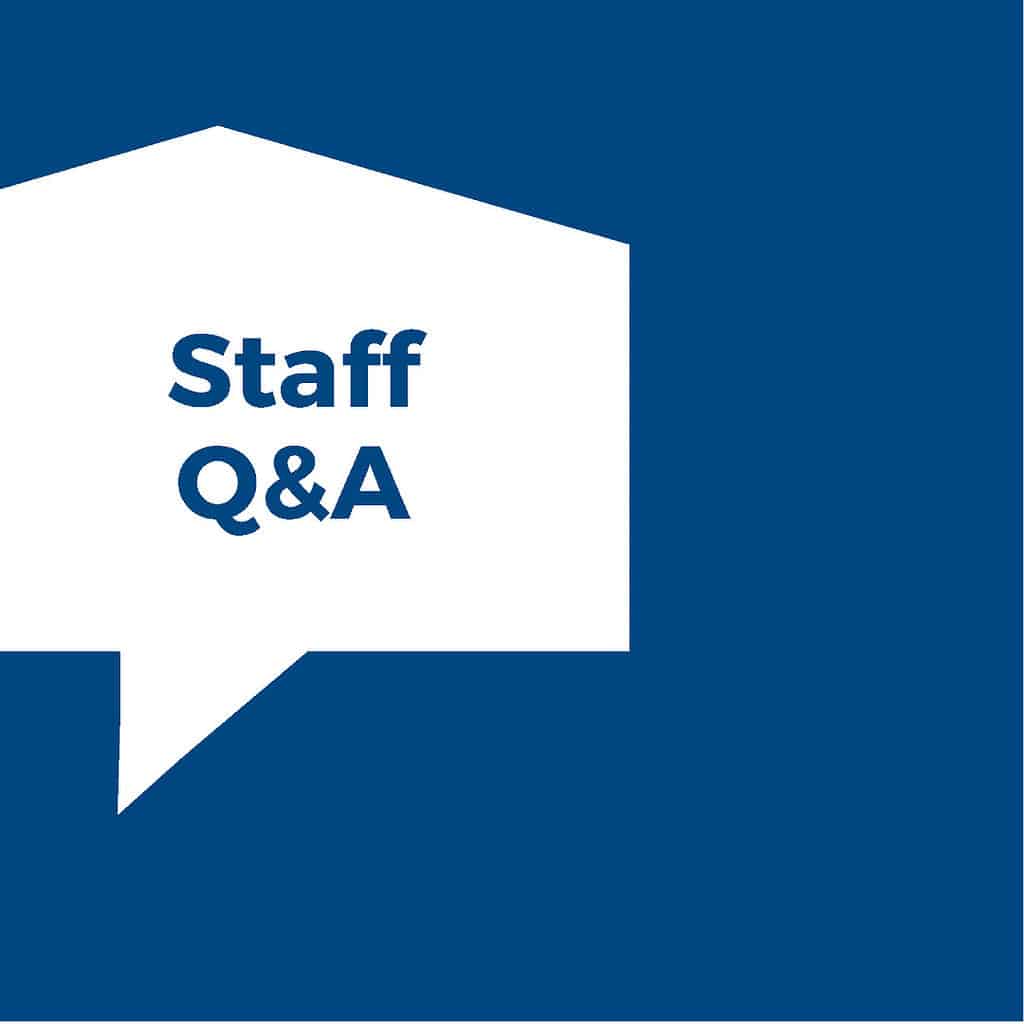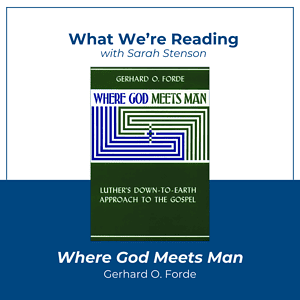Welcome to our first blog post!
It seems only fitting that we would take this opportunity to share a little more about how Luther House of Study (LHOS, as we often refer to it) got started, along with a get-to-know-you for each of our four staff members.
Whether you’re a longtime LHOS follower or new to it all, we think you’ll enjoy this rundown of our organization and faculty.
How did we get here?
You’ll get some of the finer details from Chris Croghan in his Q&A, but the long and short of it is that in 2006, Croghan was just starting out with LHOS, managing a small group of students with very little structure and no advisory board.
Sarah Stenson first came to LHOS as one of those few students, having been told by multiple people at her home congregation that she should pursue seminary.
As it happened, there was a press release about the launch of LHOS just days before, and when Stenson Googled “Lutheran Seminary, Sioux Falls,” it popped right up. She got involved on the ground floor right away as a volunteer, helping Croghan organize the course of study and draft by-laws.
The LHOS of 2006 looked rather different from where we are today, though the mission and teachings have remained consistent all these years.
“God has continued to give us daily bread. In the early days of LHOS, we wouldn’t have been able to do what we’re doing now, but what has happened in the last couple of years especially, is that our capacity to teach has increased, our comfort level with the new way we’re teaching — which allows us to teach across the globe — has increased, and personally and professionally we have more time and years of experience,” Stenson said.
“All of that, coupled with that daily bread of funding at literally the right moment, has allowed us to build the staff we have now and institutionalize LHOS to the degree it is now.”
Stenson also emphasizes the organization’s gratitude for its partnership with Kairos University.
“That relationship has grown for the last 15 to 16 years, and the seminary and other faculty are incredibly supportive, not just of LHOS having our own voice and confession, but they truly are ecumenical,” she said.
LHOS is grateful for all the support it has received over the years from each and every one of you, as well. We wouldn’t be here without you.
Now, keep scrolling to learn more about each of our staff members!
Jump to:
Sarah Stenson, CEO
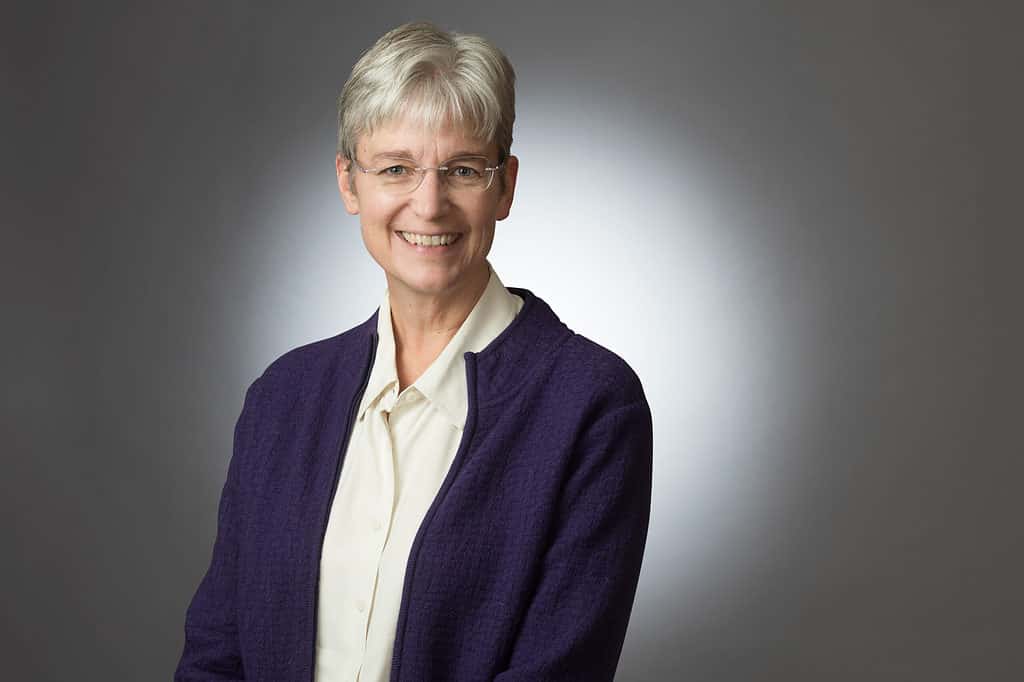
What was your background prior to LHOS?
I went to Luther College and graduated with no idea who Martin Luther was except that there was a statue on campus. I was baptized and went through confirmation in the Methodist church, but we moved a lot, so we went to whatever church was in the small town we were in. I went to law school at the University of Minnesota immediately after college, and then I married my husband, Jeff, who grew up Lutheran. That’s when I joined the Lutheran church, but at that point, I still had no idea about the Lutheran confession.
I was practicing corporate law at the time, and Jeff is a family practice doctor. He was in residency in Cedar Rapids, Iowa, and that’s when I had our daughter, Kallie. Sometime in those first two years, I gave up law entirely and stayed at home. We moved to Sioux Falls, where we got involved at a Lutheran congregation. I first participated in Bible studies and then started leading them and got really involved in our congregation. I also started reading different books on theology, and a couple pastors were giving me their books to read, too.
Eventually, when the kids were both in school, I started at Luther House. Within two to three years of starting candidacy in the ELCA, the candidacy people asked me to finish my M.Div but focus on the academics and helping Chris with LHOS. I did a lot of development work, started to TA for Chris, and people started recognizing that my call, at that point, was to teach and to keep LHOS moving forward.
What do you think is the most defining characteristic of LHOS?
There’s a statement that Luther made, “Love yields all, faith yields nothing.” That makes us unique — that’s been the modus operandi from the get-go because the heart of LHOS has always been for the people and congregations, the pastors in the pulpits of those congregations.
We bend over backwards to do everything we can to put solid Lutheran pastors in the pulpit and help nurture those pastors once they’re there, for the sake of pastoral care. It’s not that we’re doctrinal purists for the sake of having right doctrine, but we yield nothing when it comes to the Law and Gospel distinction and the proclamation of that Gospel in Word and Sacrament. It’s so easy to slip into doctrinal righteousness and fight about right doctrine, but you lose focus on what the doctrine is actually about and that’s Christ and His forgiveness.
What are you most looking forward to at LHOS?
I’m most looking forward to the continued expansion of the reach of LHOS into all these different pulpits and congregations. The team we have in place at LHOS now is functioning as a team with the same mission at our core. We have a great group of people working to train Lutheran pastors across the globe.
I know there will be stumbles and setbacks — that’s part of any institution — but it’s incredibly humbling to see the kind of people God has put in our laps. In the early years, it was just Chris and me, but now we have a great team of people who all have this same heart for the mission of LHOS. It’s humbling.
What is your favorite writing on Lutheran theology?
Where God Meets Man by Gerhard Forde. I read that book the summer before I took the Reformation class, and in the second chapter, I think, there’s a section where he talks about the closed circle of the Law and how Jesus broke the circle of the Law with his death and resurrection. I still know exactly where it is on the page — I drew a little circle. The language is deceptively simple, but the more you know and understand Scripture and Lutheran theology, the more you realize the depth of what Forde was writing in that book.
What’s something your coworkers or students might not know about you?
I love giant breed dogs, especially Newfoundlands. Up until about seven years ago, we had Newfoundlands and my goal is to get another one. There’s nothing like a newfie hug.
If someone were coming to Sioux Falls to visit LHOS, where would you take them?
Queen City Bakery on a Wednesday morning for an almond croissant.
Chris Croghan, Chief Academic Officer
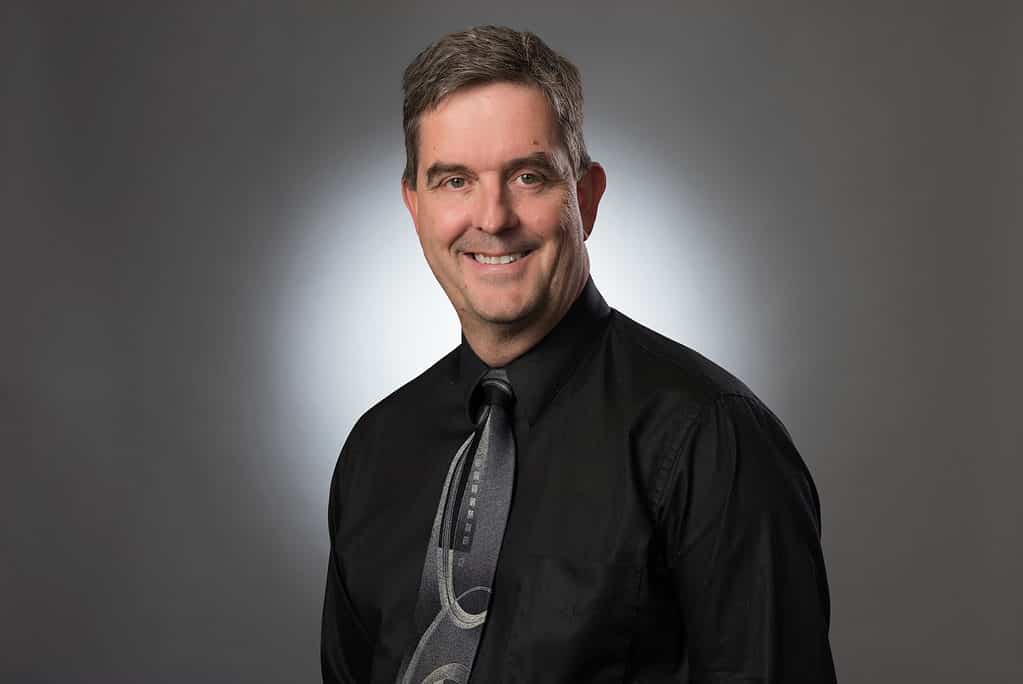
What was your background prior to LHOS?
I was a graduate of Augustana, bio and pre-med. I was actually the congregational president of the campus ministry, and I was told by the pastor there, as well as Don Niedringhaus, that I had to go to seminary. I hadn’t ever entertained the idea, but I went to Luther Seminary, graduated from there, and was a parish pastor in St. Charles, MN for five years. Then I was called back up to Luther Seminary to work on a PhD. Again, it wasn’t my aspiration, but I came back to Sioux Falls in 2003, and Augustana offered me a two-year sabbatical replacement position. They hadn’t had anyone to teach Luther in 20-some years, and they didn’t have a faculty position open for me, but community members and supporters said that voice was needed at Augustana. So, this was how the collaboration between Sioux Falls Seminary, Augustana and the South Dakota Synod began. The three got together, and that’s essentially how LHOS got started.
By 2006, I was a full-time faculty member teaching at Augustana, but I was also integrating seminary students into the classes. It was our first attempt to try to hybridize the education system. We have been innovative from the get-go in our goal of getting more pastors in an economically sound way.
What do you think is the most defining characteristic of LHOS?
Our focus has never been about building an institution but on meeting the needs of the congregations and people in the pews. It has always been a surprise to me and Sarah that we exist because we don’t try to grow or become something.
What are you most looking forward to at LHOS?
What delights me the most is hearing back from people who have either had our students in their congregations’ pulpits or who have access to the resources, and hearing how that nurtures them and encourages them.
What’s been the biggest change in the organization since you began?
It’s coming to the realization that institutions need to listen and adapt, as opposed to applying what they think is needed to the ministry and congregations of the people. What a lot of institutions do — both higher ed and churches — is adapt and apply what they would say is a mindset or culture. I think what has made LHOS successful is that we haven’t changed anything that we’ve taught or said, we’ve just changed how people access it. We’ve been successful because we’ve been very consistent, and people have recognized it. It’s a pleasant shock to Sarah and me that people identify us as a distinct brand.
What people need is always the same when it comes to ministry, and that is the Gospel.
A lot of people ask what the future holds for LHOS or other seminaries, and I say, ‘Let’s go visit the University of Wittenberg.’ It doesn’t exist anymore. Why should I expect that if the place Luther studied doesn’t even exist, that I could keep our institution in existence? That’s a good perspective to have — to keep our expectations not on building something but on delivering something.
What is your favorite writing on Lutheran theology?
Gerhard Forde’s Where God Meets Man is an essential read. It’s the book that every LHOS student reads when they first enter.
What’s something your coworkers or students might not know about you?
That I can smile and I have a sense of humor.
Tell us about your family.
Lori is my wife of 29 years, and we have a son, Jacob, who is 23 and finishing his degree at Montana State, and a daughter, Sarah, who is 20, and also at Montana State.
If someone were coming to Sioux Falls to visit LHOS, where would you take them?
I would have them sit on my back porch so I can feed them Anderson Angus, the best beef in the world (from my father-in-law’s ranch).
Lars Olson, Director of Pastoral Formation
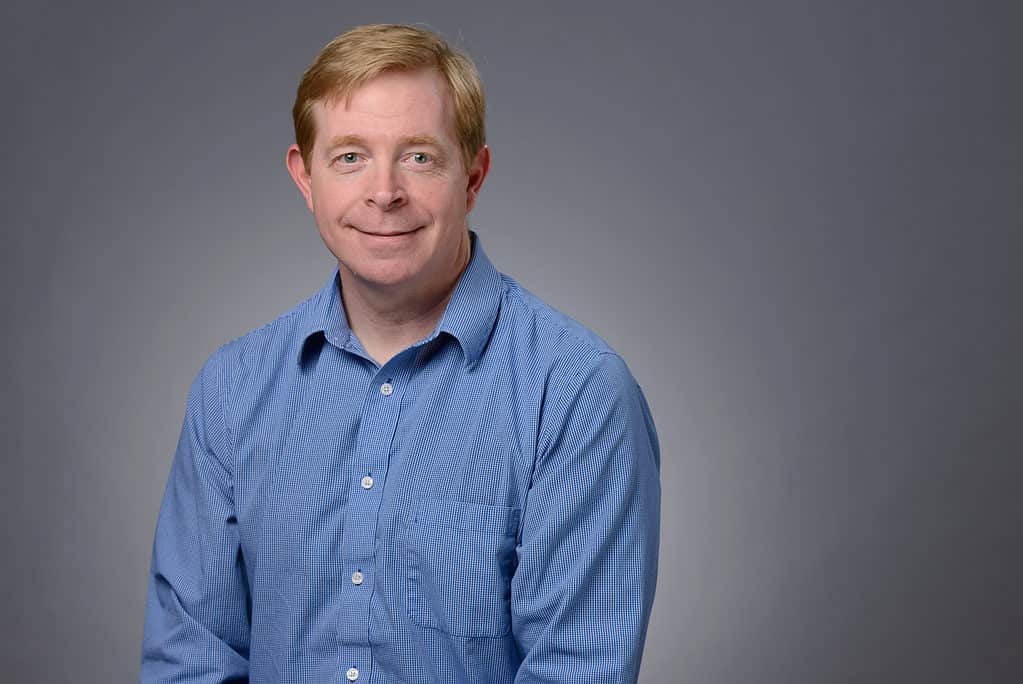
What does your role entail?
Well, we’re all teaching classes, but my role is also to maintain relationships with pastors, provide good theological content and help LHOS expand how it connects and supports pastors and congregations. It’s about helping us move into the fullness of our mission. How do we train pastors and then give them a place of ongoing support?
Tell us about your background prior to LHOS.
I grew up in California near the Bay Area, and attended Luther Seminary in St. Paul. After seminary, I moved to Ohio where I served three churches over seven years, most recently in Toledo. In 2013, I moved to Sioux Falls where I was at First Lutheran Church (FLC) until joining LHOS. Prior to seminary, I had also worked at church camps and in a congregation doing youth ministry.
I got involved with Luther House, in part, because FLC has a strong connection with them, and because I had started attending Chris and Sarah’s text studies for pastors and serving as a ministry mentor for students, and we got into conversations about theology and ministry over the years. A couple years ago Chris started asking if I’d be interested in doing some faculty mentoring with students, and then last year, we started talking about what it would look like for me to join the staff.
What do you think is the most defining characteristic of LHOS?
The directness of our theology and that we understand that there are lots of theologies, but that we have a unique confession and strong connection to Martin Luther.
Instead of saying that what you see in Lutheranism is a wide tree with lots of branches, we see all of those, but we want to stay as connected to Luther as possible, rather than to Lutheranism. That means being very focused on preaching and helping people hear the Gospel.
What are you most looking forward to at LHOS?
I’m excited for both the expansion of our core curriculum to train pastors but also the opportunities we have now with a full staff for doing some of that other stuff — content that can go beyond our seminary training and how we learn, but also provide resources that are useful for both pastors and congregations.
What is your favorite writing on Lutheran theology?
To avoid saying Forde — and this is not on Lutheran theology, but Luther himself — Luther’s Heidelberg Disputation. He’s focused like a laser on what it means to be caught in the cross of Christ for new life.
What’s something your coworkers or students might not know about you?
While at First Lutheran, I had the opportunity to marry two-thirds of our Scripture First podcast hosts: Mason and his wife, Andrea, and Adam and his wife, Allie!
Tell us about your family.
My wife Katherine (who is also a Lutheran pastor) and I have four children between ages 15 and 5, and a dog.
If someone were visiting Sioux Falls, where would you take them?
Probably downtown, but my family also goes out to Good Earth State Park a lot to walk around and get out of the city a bit.
Thanks for reading! Leave a comment below, or share this post with a friend.
Keep an eye on our blog for more content like this, and if you’re not already, follow us on social media (Facebook, Instagram, YouTube, and LinkedIn) for even more updates!
